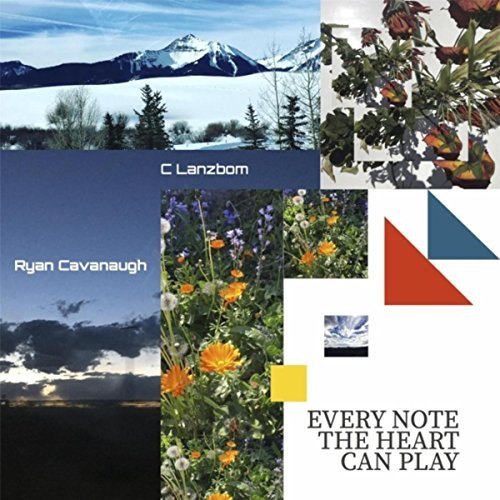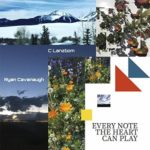
Every Heart the Note Can Play, a duet album featuring banjoist Ryan Cavanaugh and guitarist C Lanzbom’s, shares a few passing similarities to several Windham Hill releases during the 1980s. Such a comparison may cause the reader to begin searching a thesaurus for a string of pejorative synonyms for “new age.” However, the comparison intends to refer to progressive string band releases by Montreaux, Turtle Island String Quartet, Darol Anger, and Mike Marshall which featured folk, bluegrass, flamenco, choro, jazz, and chamber music mixed together. The 1985 Marshall/Anger release Chiaroscuro, feels somewhat like the older and less hip sibling to Every Note the Heart Can Play.
Ryan Cavanaugh – recently of the Jeff Austin Band – and C Lanzbom – of Soulfarm – have crafted an album which sounds lush and interesting in a way not expected of what essentially amounts to a banjo and guitar duet album. Across ten tracks, the duo touches on jazz (“Like Miles”), pastoral folk (“Colorado”), classical (“Pensif”), and even something akin to a Paco De Lucia flamenco foray (“Mr. Marino”). All of the compositions are engaging. But, they are not bluegrass. They are not truly folk either. They are ethereal, and yet grounded. All of the music sounds familiar, yet it also feels like a unique banjo based spin on the amalgamation of jazz and chambergrass.
Part of the album’s success is because Cavanaugh and C Lanzbom’s instrumental compositions balance innovation with the mellifluous. As a result, they avoid what could have been a mind numbing dissonant free jazz thought exercise and instead provide the listener with a series of visual tone poems. The compositional sparseness provides the perfect blank canvas for these two musicians to interact and express themselves. Cavanaugh’s banjo usually leads, where he uses quick brush strokes from oblique angles in the wide-open soundscapes, while C Lanzbom provides the perfect accompaniment – be it acoustic, electric, or slide– to support Cavanaugh’s succinct, slight of hand filigrees. Cavanaugh’s fills subtly become less compact and become more chordal, eventually evolving to where he supports C Lanzbom, who can then paint with broader, smoother, and yet also pleasing brush strokes in these soundscapes. The duo’s journeys are aided by quiet hand percussion, bass, and overdubbed acoustic guitars, bubbling underneath all ten tracks; all of which provides just enough “oomph” to avoid making these compositions too esoteric. Such uncluttered production allows them to see if they truly can play “every note [their hearts] can play” on songs like “Pensif,” “Like Miles,” “Colorado,” and “Mr. Marino.”
Most readers will see the word “banjo” and music described as “anything but bluegrass” and no doubt think of Bela Fleck. However, a comparison to Fleck would be a bit lazy here. First, Cavanaugh’s playing sounds more like John McLaughlin circa his first Shakti album in contrast to Fleck’s typical Pat Metheny inspired playing. Cavanaugh plays cleaner, faster, and with a more “out” jazz sensibility than Fleck has exhibited, even with Chick Corea. Second, Fleck has never released or recorded anything quite like Every Note the Heart Can Play. No banjo player has, not even Cavanaugh during his days playing with legendary jazz saxophonist Bill Evans, his time leading his Flecktones inspired project Spacestation Integration, or when he mined bluegrass on the stunning Songs for the New Frontier. All of which means this release is a worthy addition to the newgrass/jamgrass/chambergrass fan’s collection, “new age” pejoratives be damned.



No Comments comments associated with this post